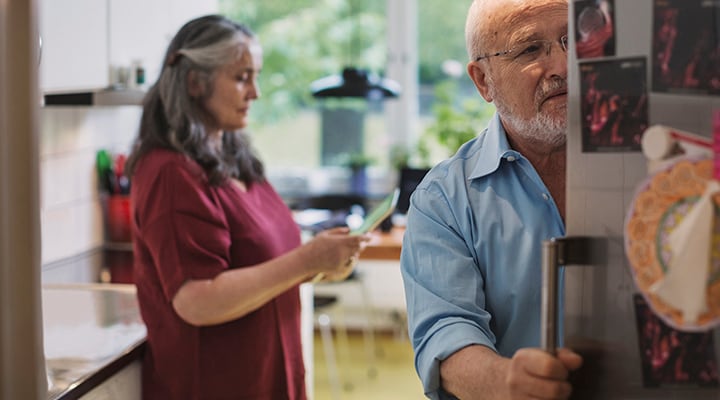Pandemic weight gain: How to get on top of it
One of effects of life in lockdown is that many people are experiencing weight gain as their routines change. Here are a few ways to help you get back on track.
No matter where you live in Australia, COVID-19 has changed how we work and study, altered how we socialise and exercise, and taken away many aspects of physical contact. Some of us have even experienced curfews and limitations on how long they can exercise each day.
While these measures were designed to contain the transmission of the virus, some people are experiencing financial stress, loneliness and deterioration in their mental health as a result of these measures.
An Aussie study looking at the impact of lockdown on at-home weight loss showed 60% of people surveyed believed their diet had been affected, and 52% said the same about their exercise routine.

The cause of pandemic weight gain
The very presence of an unprecedented global pandemic created psychological stress, with many of us fearing what could happen. Social distancing measures made many people feel isolated and lonely, which leads to further emotional distress. Feelings of anxiety are also exacerbated by the worsening of socioeconomic conditions seen with business closures and job losses.
When you’re financially strapped, your diet quality suffers. Research shows that people of lower socioeconomic status are more likely to follow nutrient-poor, energy-dense diets high in refined grains, added sugars and added fats. Highly processed foods are easy to eat, cheap and readily available, and they stimulate your appetite, which can lead to overeating. Likewise, stress can lead to overeating as emotional eating is often used to relieve negative feelings.
Respondents who said gained weight in the recent CSIRO research, 61% reported an increase in junk food consumption, while 63% reported an increase in snacking. One contributing factor is likely that home confinement challenges restraint and could enhance impulsive eating behaviour, increasing the likelihood of pandemic weight gain.
The pandemic has also reduced physical activity levels. Many of the study’s participants reported being less active since working from home. Incidental exercise that comes with commuting to work or taking the kids to school was reduced, and almost one in two people reported an increase in screen time.
The amount of time dedicated to exercise also decreased for some. According to research published in the journal Obesity Research & Clinical Practice, a lack of access to fitness facilities such as gyms during lockdown reduced exercise levels. A loss of social exercise and social motivation were also reasons given for a reduction in exercise. The combination of less physical activity and an increase in food consumption has been the perfect formula for weight gain during COVID-19.
How to lose pandemic weight after lockdown
The good news is there’s plenty you can do to get back to a healthier, fitter you. Here are a few simple, helpful tips:
- Plan your food: spend time planning what you will eat throughout the week and only purchase the food you need. Maintain structure in your day and eat at regular times so you avoid grazing all day long.
- Load up on whole foods: make sure your grocery shop is full of delicious whole foods such as wholegrains, lean meat, fish, dairy products, nuts, fruits and vegetables – including canned and frozen fruit and vegetables. Limit the amount of junk food you bring into your home so you’re not tempted to make poor food choices or snack too often.
- Keep yourself busy: avoid ‘boredom eating’ by filling your time with other activities like fixing things around the house, starting an online course, reading a book or hosting a virtual trivia night with friends.
- Manage your stress: instead of heading for comfort food, look for other ways to manage your stress. Go outside for a walk, practise yoga, meditate, call a friend or play with your kids.
- Get active: be as active as you can throughout the day, breaking up each hour with some movement like walking outside or stretching. On top of this, try to schedule in one hour of exercise every day.
Weight management support
Feeling like you need help to maintain a healthy weight? If you’re overweight and living with osteoarthritis, HCF members with eligible cover might be able to access our free Osteoarthritis Healthy Weight for Life program. This can tailor your nutrition; help you get moving and provide expert advice. You must have an eligible hospital product and meet the program’s eligibility criteria.
We’re also helping eligible members save on the evidence-based CSIRO Total Wellbeing Diet. Created by Australia’s national science agency, it combines a higher protein, low-GI eating plan with proven weight loss tools to help improve habits and create lifelong positive behaviours.
Updated November 2021
Related articles
Easy home workout routines
You don’t need to play sport, join a gym or invest in equipment to exercise.
Healthy Weight For Life
For people with long-term health complications, losing weight can turn around their health.
Coronavirus and mental health
Prioritising mental health is always important. But during an unprecedented situation, it’s essential.